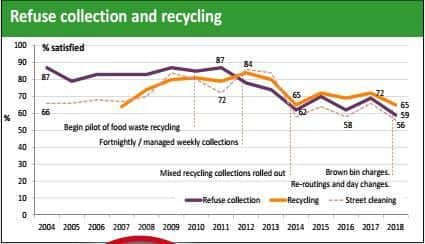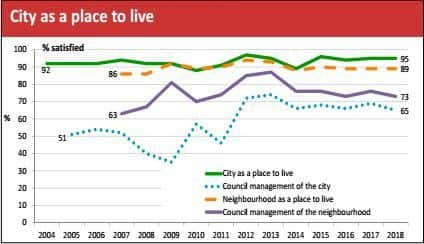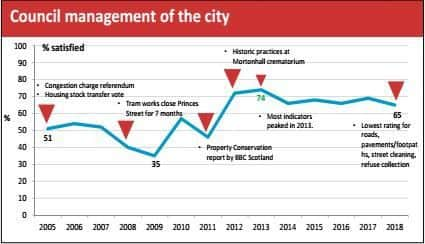Satisfaction of Edinburgh residents with bin collection and street cleansing at 15-year low


Satisfaction with maintenance of roads and pavements has also fallen - and people claim vandalism, graffiti, anti-social behaviour and dog fouling are on the increase.
But a huge 95 per cent gave Edinburgh the thumbs up as a place to live.
Advertisement
Hide AdAdvertisement
Hide AdThe latest edition of the city council’s Edinburgh People Survey (EPS) - the largest face-to-face survey undertaken by any UK local authority on residents’ perception of council services and quality of life issues - questioned 5170 residents across the city between September and December 2018.


While overall satisfaction with the Capital as a place to live remains very high, just 59 per cent said they were satisfied with refuse collection - down from about 70 per cent in 2017 and well below the high of 87 per cent recorded in both 2004 and 2011.
The survey coincided with the introduction of the annual £25 “garden tax” charge for brown bin collections and a shake-up of all kerbside collections.
Satisfaction with street cleansing was even lower at just 56 per cent, a fall of about nine points since 2017 and dramatically down from a high of 84 per cent in 2012.
Advertisement
Hide AdAdvertisement
Hide AdRecycling also saw a fall in satisfaction rates - down from 72 per cent in 2017 to 65 per cent, the same figure recorded in 2014 when mixed recycling collections were rolled out.


The council said the fall in satisfaction mirrored a downward national trend in how people felt about such services.
Satisfaction with maintenance of roads, pavements and footpaths had dropped as well.
And survey respondents felt that vandalism, graffiti, antisocial behaviour and dog fouling had become more common in their neighbourhood over the past four years.
Advertisement
Hide AdAdvertisement
Hide AdSatisfaction with the way these issues are dealt with also decreased.


Older respondents were less satisfied than younger residents with road and pavement maintenance, refuse collection and street cleaning.
However, they were more satisfied than younger residents with recycling services.
Those with children in the household were more likely to be dissatisfied with the way dog fouling was dealt with in their neighbourhood.
Advertisement
Hide AdAdvertisement
Hide AdSome 65 per cent said they were satisfied with the way the council is managing the city - down from 69 per cent in 2017 and significantly down from the 74 per cent recorded in 2013, but much higher than the low of 35 per cent in 2009, during the tramworks.
The council said a similar pattern of declining satisfaction could be seen in local authorities throughout the UK.
Residents reported a high degree of satisfaction with the centre of Edinburgh for shopping, culture and leisure activities and public transport to and within the city centre.
Some 89 per cent said they were satisfied with their neighbourhood as a place to live and 73 per cent were happy with the council’s management of their area.
Advertisement
Hide AdAdvertisement
Hide AdAs in previous years, agreement and satisfaction with the council and the city tended to be lower amongst unemployed people and those with long term illness or disability.
Asked about whether the council provided value for money, a total of 35 per cent said it did while 23 per cent disagreed, 23 per cent said neither agreed nor disagreed and 19 per cent didn’t know.
Meanwhile 36 per cent said they felt they had a say on local issues and services, but 44 per cent said they did not feel they had a say and 20 per cent were not sure.
Council leader Adam McVey welcomed the survey findings. He said “It’s hugely encouraging to see that once again residents are extremely happy with life in the Capital and that the vast majority feel safe and included in their communities - testament to how diverse and welcoming Edinburgh is.
Advertisement
Hide AdAdvertisement
Hide Ad“The EPS gives us an invaluable insight into the impact our work and decisions have on public perceptions across the city, helping us understand our communities and their experience of our services so we can direct our energy and resources where they’re most urgently needed.”
He said the survey results would inform the council’s future plans so that it could deliver the best possible services for the city and for everyone who called it home.
He added: “Surveys like this also highlight our ongoing challenges, such as the dip in satisfaction with services including refuse collection and recycling.
“We’re now making real improvements in our waste and roads management, with improvement plans for both areas already bearing fruit.
Advertisement
Hide AdAdvertisement
Hide Ad“Our roads condition is now above the Scottish average and our pothole repair performance is getting significantly better.
“Meanwhile the brand new Millerhill recycling and energy recovery centre will divert many thousands of tonnes of waste from landfill and drive up recycling rates for both us and Midlothian Council.
“The EPS was conducted when the new waste collection arrangements got under way, as well as the chargeable brown bin service - undoubtedly the issues experienced while these changes were bedding in will have coloured people’s responses to the survey.
“I’m happy to report that things have settled down significantly since the autumn and we will keep driving performance up through our Waste Improvement Plan.”